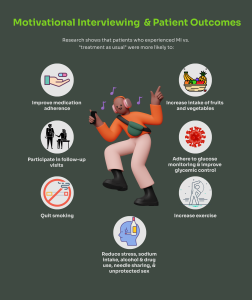The Clinician’s Role in Change
As physicians, we’re uniquely positioned to guide our patients through the process of health-related change. We understand the impact of health behaviors and the potential benefits of change. We are trusted advisors and educators, with access to intimate details of our patients’ lives. By combining our knowledge of human behavior with our interviewing skills and compassion, we can help our patients achieve personally meaningful goals.
We can be most effective in promoting change when we honor our patients’ autonomy and evoke their reasons and plans for change. Only they know what’s most important to them, and what the costs and benefits of change will be. Only they can make the decision to change. Without this patient-centered partnership, we risk alienating patients and increasing their resistance to change.
This video shows how a well-intentioned behavior change conversation can go awry – frustrating, ineffective, unrewarding, and rapport busting. Have you experienced either side of a conversation like this before? This physician’s intention was to help – why doesn’t it work? This is a short clip from a longer video (available on YouTube) – you’ll see a better version of this interaction later in this module.
Historically, most doctors, like this one, simply explained why they recommended a change and expected patients to make it, which wasn’t terribly effective. Neither was advice giving or scolding. While knowledge is a prerequisite for change, it usually isn’t sufficient – most of us are naturally inclined to resist unsolicited advice or coercion and have trouble changing unless the reasons for change are our own.
An alternative to this frustrating interaction is motivational interviewing (MI), which was developed in the 1980s by clinical psychologists Drs. William Miller and Stephen Rollnick. They describe MI as “a collaborative person-centered form of guiding, to elicit and strengthen motivation for change.” Although it was originally used to treat addiction, MI has been adapted to many different health problems that are common in the primary care setting.
Research shows that compared to ‘treatment as usual’, patients exposed to MI are more likely to change.
- Improve medication adherence
- Participate in follow-up visits
- Adhere to glucose monitoring and improve glycemic control
- Increase intake of fruits and vegetables
- Increase exercise
- Reduce stress, sodium intake, alcohol and drug use, needle sharing, unprotected sex
- Quit smoking
 In this workshop, we will explore the ‘spirit’ that underlies effective and ethical MI and practice key communication techniques and strategies.
In this workshop, we will explore the ‘spirit’ that underlies effective and ethical MI and practice key communication techniques and strategies.
Resources & references
A Dialogue with MI Co-Founder William Miller, Columbia U School of Social Work, 25 minutes and interesting! YouTube
Summary of controlled clinical trials involving MI. https://motivationalinterviewing.org/sites/default/files/mi_controlled_trials_2020_nov.pdf
